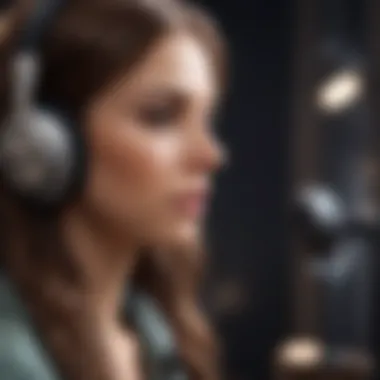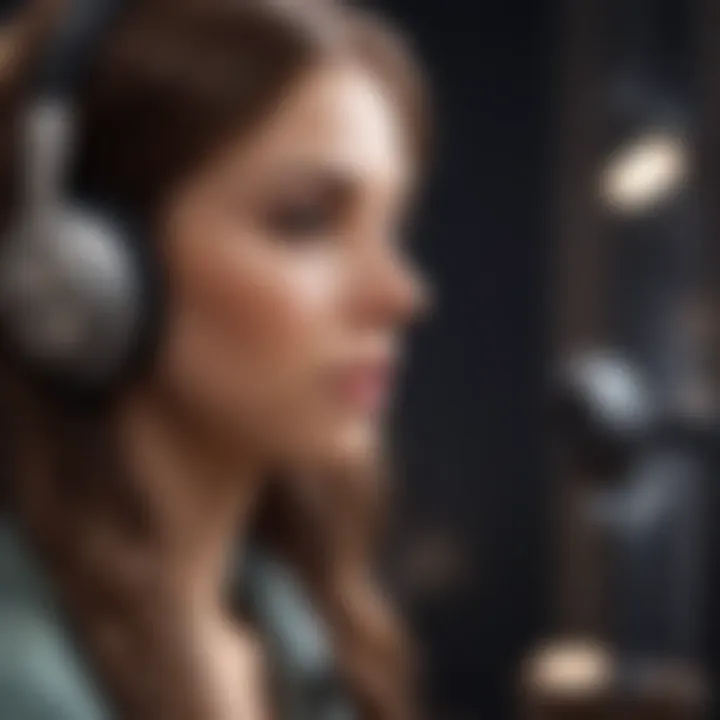Exploring the Depth of Rez Up in Music Engagement


Intro
Musical engagement is a multifaceted experience that varies for every listener. It encapsulates how individuals interact with music on personal and cultural levels. The term "rez up" represents a shift in this engagement, serving as a profound vehicle for music appreciation. This section introduces the key concepts, emphasizing the rich interaction music promotes and how it can reshape listener dynamics. Understanding "rez up" requires examining the complexities behind it, from personal connections to community influences.
Artist Profile
Biography and Background
To fully appreciate the concept of "rez up", it's essential to understand the artists who embody this spirit. Their backgrounds are often diverse, influencing their styles and approaches to music. Many artists come from varied cultural contexts that inform their art. This cultural backdrop plays an integral role in shaping the resonance of their music.
Major Influences and Inspirations
When analyzing an artist's work, one must consider their inspirations. Musical inspirations often include genres that resonate deeply with them. For example, an artist may draw from classical compositions while intertwining modern electronic influences. Their unique blend creates a distinctive sound that often highlights the essence of "rez up". By recognizing these influences, listeners gain insight into the broader narratives encapsulated in their music.
Song Analysis
Theme and Lyrics Breakdown
The thematic elements within a song reflect the artist's message and engage the listener emotionally. Often, lyrics serve as a narrative tool, allowing for personal interpretation. These themes can range from social commentary to introspective musings. Engaging with the lyrics critically enables listeners to connect more profoundly with the music. It encourages a deeper understanding of the subject matter.
Instrumentation and Composition
Instrumentation and composition are crucial in shaping the overall mood and impact of a piece. The choice of instruments can enhance the emotional weight of the song. For instance, a guitar-heavy track may evoke feelings of nostalgia, while electronic beats may stimulate modernity. Understanding how these elements interplay allows listeners to appreciate the technical aspects of music and its cultural ramifications.
"Music is an outburst of the soul." - Frederick Delius
Understanding Rez Up
Understanding "rez up" is significant in the realm of music engagement and appreciation. This concept acts as a bridge connecting various aspects of musical enjoyment, ranging from emotional resonance to critical listening. By dissecting the layers of "rez up," we can uncover its influences on listeners and musicians alike, enhancing both experience and appreciation.
Definition of Rez Up
"Rez up" refers to a heightened state of musical engagement where listeners experience a deeper connection to the music. This goes beyond mere auditory enjoyment. It involves active participation, emotional resonance, and critical analysis of musical elements such as rhythm, melody, and lyrics. In essence, rez up encapsulates the interplay between the listener’s emotional state and the music itself, allowing an individual to transcend the surface level of listening.
Historical Context
The term "rez up" has roots in the evolving landscape of music consumption. As genres developed and technology advanced, the ways in which people interact with music changed. In the early days, music was often a communal experience, with live performances fostering a sense of connection. However, with the rise of recorded music and digital platforms, personal listening experiences became more common. This shift prompted a reevaluation of music engagement, paving the way for concepts like rez up to emerge. By understanding this historical framework, we can appreciate how it shaped our current musical interactions.
Cultural Significance
The cultural significance of "rez up" lies in its ability to bridge divides between different musical traditions and communities. It encourages listeners to explore diverse genres and appreciate cultural contexts that shape music. As cultures intertwine and influence each other, the rez up concept helps highlight the importance of understanding the background of various musical forms. This engagement is not only beneficial for the listener but also for musicians, as they find inspiration in a wide array of influences.
Rez up acts as a lens through which cultural diversity in music can be celebrated and explored.
By fostering a profound appreciation for music across boundaries, the concept of rez up can enrich personal experiences and promote a broader understanding of the musical landscape. It emphasizes that music is not just a commodity but a shared human experience, resonating deeply within us.
The Psychological Impact of Music Engagement
The exploration of how music engagement influences the psyche is indeed significant in understanding the broader implications of the concept of rez up. Engagement with music goes beyond mere listening; it encompasses emotional, cognitive, and social dimensions that enrich human experience. This section examines how music interacts with our emotions and thoughts, enhancing appreciation and involvement.
Emotional Connections
Music possesses a unique ability to evoke emotions. Each listener's personal history shapes emotional responses to various pieces of music. For instance, a song may remind someone of a happy childhood memory or a poignant moment in their life. This personal connection strengthens the bond between the listener and the music, fostering a deeper appreciation for it.
In many cases, music acts as a form of emotional expression. Artists convey feelings through their lyrics and melodies, creating a shared experience for listeners.
Here are some key points about emotional connections in music:
- Mood Regulation: Many people use music to influence or alter their mood. For example, upbeat music can uplift spirits, while slower melodies may help to relax.
- Social Connection: Sharing music can lead to profound connections between individuals. Concerts, festivals, and even simple playlists can create collective experiences that bind people together.
- Therapeutic Potential: Music therapy is an established practice that aids in emotional healing. It helps individuals connect with feelings they may struggle to express otherwise.
This potent emotional aspect of music has profound implications for how we engage with it, ultimately enriching our overall experience.
Cognitive Benefits


Engagement with music also has significant cognitive advantages that merit attention. Research indicates that music can enhance cognitive functions such as memory, attention, and problem-solving skills. For instance, learning an instrument involves complex coordination, which fosters brain development and improves mental agility.
Some of the pivotal cognitive benefits include:
- Improved Memory: Listening to or performing music can aid memory retention. Techniques like mnemonic devices often use music to help remember information.
- Enhanced Concentration: Among students or professionals, certain genres of music can help maintain focus during work or study sessions.
- Problem Solving Skills: Engaging with music involves analytical thinking and creativity, valuable skills across diverse fields.
Music is not just entertainment; it is a potent tool for cognitive enhancement, shaping how we think and learn.
Exploring the Genres
The exploration of various music genres is crucial in understanding the concept of rez up. Each genre carries its unique history, cultural significance, and emotional resonance that can enrich an individual's music engagement. By examining different genres, listeners can discover distinct sounds, rhythms, and lyrics that resonate personally. This journey through genres facilitates deeper emotional connections with music, fostering an engaging listening experience. Moreover, it prompts questions about identity, community, and creativity, thereby deepening appreciation for music as an art form.
Rock and Its Evolution
Rock music, originating in the 1950s, embodies a spirit of rebellion and innovation. Its evolution mirrors societal changes and technological advancements. Early rock was heavily influenced by blues and country, showcasing electric guitars and distinctive rhythms. Artists like Elvis Presley and Chuck Berry set the stage for generations to follow.
In the 1960s and 1970s, rock diversified into sub-genres such as punk, heavy metal, and progressive rock. Each brought new elements and ideologies, shaping culture worldwide. Bands like The Beatles and Pink Floyd expanded the boundaries of musical creativity. Today, rock continues to evolve, incorporating electronic elements and global influences. This ongoing transformation highlights how rock music captures the zeitgeist of each era, making it relevant to both casual listeners and aspiring musicians.
Hip-Hop: A Cultural Movement
Hip-hop is not merely a genre; it is a cultural movement that emerged in the 1970s in the Bronx, New York City. This genre integrates rhythm and poetry through lyrical storytelling, addressing social issues, personal experiences, and cultural pride. Artists like Grandmaster Flash and Afrika Bambaataa laid the groundwork, while later figures such as Tupac Shakur and The Notorious B.I.G. elevated hip-hop into mainstream consciousness.
The cultural significance of hip-hop extends beyond music. It has influenced fashion, art, and language, creating a vibrant subculture that resonates globally. Events like block parties and cyphers showcase community engagement. Furthermore, hip-hop's ability to express feelings and experiences makes it an essential medium for personal and collective storytelling. For music enthusiasts, understanding hip-hop's roots helps appreciate its ongoing evolution and relevance within society.
Electronic Music Trends
Electronic music has gained prominence over the past few decades, merging technology with creativity. Originating in the mid-20th century, it expanded through genres such as house, techno, and trance. Pioneers like Kraftwerk and Giorgio Moroder introduced synthesizers and drum machines, transforming music production.
Today, electronic music thrives on digital platforms. Artists like Calvin Harris and Deadmau5 have popularized the genre, making it accessible to new audiences. The rise of festivals such as Tomorrowland and Ultra Music Festival reflects the growing community around electronic music. Moreover, the interplay between live performance and DJing continues to redefine the concert experience.
This genre's evolution illustrates the dynamic nature of music in a digital age. It encourages exploration, inviting listeners to engage in both the technical and artistic aspects of music creation. Recognizing these trends allows music lovers to appreciate the innovation and cultural exchange present within electronic music.
Rez Up in Contemporary Music
In the digital era, the concept of Rez Up is central to understanding musical engagement. Contemporary music is not just experienced; it’s interpreted and shared through multiple platforms that enhance our perception and appreciation. This section delves into significant factors such as the role of social media and streaming platforms in reshaping music appreciation today. Both elements together create a profound shift in how individuals connect with music.
Social Media's Role
Social media has transformed communication, creating new avenues for music interaction. Platforms like Instagram, TikTok, and Twitter allow users to share their musical experiences in real-time. Users don't just consume music passively; they actively engage with it. For instance, songs become viral trends on TikTok, as users showcase their favorite tracks through unique dances or creative lip-syncs.
This has led to the rise of communities where artists and fans converse about music, collaborating in a virtual space that previously did not exist. Musical discussions on Facebook and Reddit also enhance the experience, allowing fans to share insights, opinions, and even personal stories regarding their favorite tracks.
"Social media allows for an audience to discuss, dissect, and delve deeper into music, effectively enhancing the cultural significance of a song."
Such engagement fosters a sense of belonging among listeners. It builds a narrative around songs that often extends beyond the music itself, leading to dedicated fan tributes and new ways of participation such as fan art and cover challenges.
Streaming Platforms Impact
Streaming platforms like Spotify and Apple Music have dramatically changed how we access and interact with music. These services provide vast libraries that allow users to discover various genres and artists worldwide. Rez Up in this context reflects an increased accessibility to music that encourages engagement.
With features like playlists created by listeners or curated by algorithms, music lovers discover new tunes aligned with their tastes. They can also explore the historical context of songs through recommendations based on listening habits. This ongoing discovery process enhances the user's connection to the music, promoting more profound appreciations of different genres.
Moreover, data analytics from these platforms empower artists by providing insight into their audience. Musicians can tailor their marketing strategies or set their tour locations based on listener demographics. For many, the streaming experience transforms passive listening into an active exploration of music.
Engagement Strategies for Music Lovers
Engagement strategies for music lovers are fundamental components in enhancing the listening experience. They serve to deepen one’s appreciation and understanding of music as an art form. By actively participating in one’s musical journey, listeners can cultivate a more profound connection with the sounds that resonate with them. These strategies not only foster individual growth but also encourage community participation, which is crucial in today’s diverse musical landscape.
Active Listening Practices
Active listening is a dynamic skill that transforms the experience of music consumption. Unlike passive listening, which often occurs in the background while multitasking, active listening demands full attention from the individual. This practice involves focusing on the nuances within a piece, such as the arrangement, instrumentation, and lyrical depth.
Engaging in active listening can lead to greater emotional responses and intellectual engagement. Here are some effective practices:
- Limit distractions: Create a dedicated space free from interruptions where the sole purpose is to listen to music.
- Use high-quality audio equipment: Invest in headphones or speakers that enhance sound quality, allowing for a richer experience.
- Take notes: Jot down thoughts on themes, motifs, and personal feelings that arise during listening sessions. This active engagement can enhance recall and reflection.


Creating a Musical Diary
A musical diary serves as a personal archive of songs, experiences, and reflections surrounding music. This strategy encourages individuals to document their musical journey, making it easier to trace their evolving tastes and influences over time. A musical diary can be structured in various ways:
- Song listings: Regularly list songs that resonate with you and write brief comments on why they matter.
- Genre exploration: Dedicate entries to specific genres, noting how your understanding and appreciation of them develop.
- Concert experiences: Write about live performances and how they impacted your perception of artists and songs.
By maintaining a musical diary, listeners can not only track their engagement but also discover patterns in their preferences and emotional connections to different styles.
Participating in Music Communities
Engagement does not happen in isolation. Participating in music communities is a beneficial approach for those seeking to enhance their understanding and appreciation of music. These communities can take various forms:
- Online forums: Websites like Reddit provide spaces for discussion about different genres, artists, and listening strategies.
- Local groups: Joining or starting local music clubs can foster deeper interactions with similarly passionate individuals, creating a supportive environment for sharing ideas and insights.
- Social media platforms: Engaging with artists or music enthusiasts on platforms like Facebook can also increase exposure to new music and ideas, enhancing one's overall experience.
Participation in music communities fosters connections that not only enrich the listening experience but also promote the exchange of knowledge and ideas.
Through these strategies—active listening practices, keeping a musical diary, and participating in music communities—listeners can cultivate a more meaningful musical engagement. These methods elevate the way individuals experience music, leading to a greater appreciation of its many dimensions.
The Role of Music Education
Music education plays a vital role in how we understand and engage with the concept of rez up. It helps not only in building a foundation for appreciating music but also enhances the skills that contribute to meaningful music engagement. By incorporating rez up into educational curricula, students can learn about the nuances of musical genres, the emotional weight of songs, and the ways music influences social interactions.
The benefits are multifaceted. First, music education fosters creativity, allowing students to explore their musical interests deeply. It promotes active listening, encouraging critical thinking about what they hear. This deeper engagement is crucial for developing personal tastes and preferences, leading to a richer music listening experience.
A strong music education program also provides students with exposure to a diverse range of genres. As they learn about different styles, they can apply the concept of rez up to various forms of music. This encourages a broader appreciation for music as an art form, transcending cultural boundaries.
Curricula Incorporating Rez Up
Incorporating the concept of rez up into music education curricula can be transformative. Programs should be designed to expose students to different musical genres and the impact of cultural contexts. Here are some ways to integrate rez up into curricula:
- Genre Exploration: Include units that explore various musical styles, such as rock, jazz, and hip-hop. Discuss their historical significance and cultural contexts.
- Song Analysis: Teach students how to analyze songs critically. Break down lyrics, melodies, and instrumentations, enabling deeper emotional connections to the music.
- Music Projects: Encourage students to create their music while emphasizing the principles of engagement. This active participation can embody the essence of rez up.
By emphasizing rez up, students can develop a holistic understanding of music, enabling them to appreciate more than just the surface elements of songs.
Encouraging Critical Listening Skills
Critical listening skills are essential for true engagement in music. Music education can enhance these skills through various teaching methods. When students learn to listen critically, they can distinguish between different musical elements, understand compositions, and appreciate the artist's intent. Here are some methods to encourage critical listening:
- Focused Listening Sessions: Conduct sessions where students listen to specific tracks and discuss their thoughts and feelings. This creates an environment for shared insights and reflections.
- Listening Journals: Encourage students to keep journals of their listening experiences. They should note what resonates with them, any emotional responses, and personal interpretations.
- Peer Discussions: Organize discussions where students share their viewpoints on various tracks. This not only helps reinforce critical thinking but also allows them to learn from peers.
"Developing critical listening skills opens the door to deeper music appreciation.”
In summary, the role of music education in relation to the concept of rez up is invaluable. Through thoughtful curricula that incorporates genre exploration and critical listening skills, music education can significantly enhance how individuals engage with and appreciate music.
Challenges in Music Consumption
The landscape of music consumption has evolved significantly over the past few decades. As accessibility increases, listeners face unique challenges that can diminish the overall experience. Understanding these challenges is crucial for both artists and listeners who seek to enhance their relationship with music. This section focuses on two primary areas: overexposure to music and the quality vs. quantity dilemma. Each of these factors plays a significant role in how music is consumed and appreciated today.
Overexposure to Music
With the rise of streaming platforms like Spotify, Apple Music, and YouTube, listeners have an overwhelming amount of music at their fingertips. This abundance can lead to overexposure. Music enthusiasts may find themselves flooded with new releases, playlists, and recommendations. Instead of fostering a deeper connection with specific artists or albums, listeners often experience a superficial engagement with countless songs.
The problem of overexposure is twofold:
- Attention Fragmentation: Continuous access to new tracks can split listeners' focus. It makes it harder to form emotional connections with individual pieces.
- Decision Fatigue: The sheer volume of available music can overwhelm listeners. Instead of enjoying the experience, listeners may feel pressured to choose from a plethora of options.
To combat this, it is essential for listeners to set boundaries. Curating personal playlists or exploring music from specific genres can help maintain a focused listening experience, leading to deeper engagement.
"In a world saturated with choices, the truly rewarding experiences often come from intentional engagement rather than passive consumption."
Quality vs. Quantity Dilemma
The debate over quality versus quantity in music consumption is pertinent in today's digital age. While accessibility to music has increased, the quality of what is consumed has often diminished. Many listeners prioritize the quantity of music they hear over the depth of their listening experience.
Several factors contribute to this dilemma:


- Algorithmic Suggestions: Streaming services frequently suggest music based on user behavior, which can lead to repetitive and formulaic listening habits. This means listeners might miss out on innovative or lesser-known artists in favor of mainstream hits.
- Disposable Culture: The ease of accessing vast amounts of music has fostered a disposable culture. Tracks can be skipped or ignored, causing many to overlook intricate compositions that deserve detailed contemplation.
Listeners need to approach music consumption mindfully, actively seeking out high-quality content. This means appreciating full albums rather than just hit singles and exploring hidden gems across various genres.
Future of Rez Up in Music
The future of Rez Up in music embodies a significant exploration of how music engagement continues to evolve. This section probes into emerging trends and technologies that shape the way listeners interact with music today and what that interaction might look like in the coming years. By considering both the technological advancements and the shifting cultural landscape, we unveil the layers of complexity surrounding music appreciation and engagement.
Emerging Trends and Technologies
As technology advances, the way we engage with music transforms. Several trends are becoming prominent:
- Artificial Intelligence in Music Creation: AI tools are increasingly used to analyze listener preferences and even compose music. This assists musicians in creating relevant content that resonates with their audience, enabling personalized experiences.
- Virtual and Augmented Reality: These technologies are changing live music experiences. Virtual concerts provide access to performances regardless of geographic limitations, allowing fans to engage with their favorite artists in innovative ways.
- Interactive Streaming Platforms: Platforms such as Spotify and Apple Music are enhancing user experience by offering features like collaborative playlists, social sharing, and personalized playlists, all of which encourage deeper engagement with music.
- Blockchain Technology: This technology may provide possibilities for secure transactions between artists and fans. Smart contracts could ensure artists are fairly compensated for their work, promoting more direct engagement between creators and their audience.
These trends highlight a shift towards a more interactive, personalized, and equitable music ecosystem. It is important for artists, listeners, and stakeholders to remain informed and adaptable to these changes.
Predictions for Music Engagement
Considering the current trajectory of music consumption and engagement, several predictions arise:
- Integration of Music with Everyday Life: As smart devices become more prevalent, music will likely integrate more seamlessly into daily routines. This will include music being embedded in smart home devices, making it easier for listeners to access music when they need it.
- Increased Accessibility of Music Education: Online courses, tutorials, and platforms will expand access to music education, allowing more individuals to immerse themselves in music. This shift could lead to a more informed audience who appreciates music on a deeper level.
- Sustainability in Music Practices: With a growing awareness of environmental concerns, the music industry may adopt more sustainable practices for events and production. This could resonate with a socially conscious audience, influencing their engagement choices.
- Greater Emphasis on Authenticity: As more music becomes readily available, audiences may gravitate towards authenticity. Musicians who share their personal stories and journeys may foster stronger connections, enhancing engagement.
"The future of music engagement is not just about technology; it's about creating authentic connections and experiences that resonate with listeners on multiple levels."
In summary, the future of Rez Up in music is not merely a prediction of trends but a promising landscape of engagement filled with potential. Music enthusiasts, aspiring musicians, and industry professionals should pay close attention to these developments, as they hold the key to enhancing their appreciation and participation in the art form.
Influence of Local Versus Global Music Scenes
In today’s quickly changing music environment, the influence of local and global music scenes is profound and far-reaching. This article addresses how these influences impact music engagement. Understanding the dynamics between these two spheres can help music enthusiasts navigate and appreciate the diverse soundscape of contemporary music.
Local music scenes often represent unique cultural identities. They cultivate regional genres that embody the spirit and heritage of their communities. These genres contribute to a distinct auditory experience, often appealing to listeners’ emotions and personal connections. For instance, sounds from Nashville's country scene resonate deeply with local traditions. Similarly, the vibrant mariachi music in Mexico showcases local cultures while fostering a sense of pride.
Global music, on the other hand, brings together influences from various cultures, creating a rich tapestry of sounds that can sometimes overshadow local genres. It introduces a broader audience to diverse musical styles, promoting cross-cultural collaborations. As a result, listeners find new genres and influences, leading to a more eclectic musical taste.
Integrating local sounds with global trends adds depth to musical engagement. It encourages listeners to explore music beyond their immediate environment, expanding their appreciation. Therefore, understanding both local and global elements is crucial for aspiring musicians, scholars, and avid listeners seeking to enhance their musical connection.
Regional Genres and Their Impact
Regional genres function as cornerstones of local music scenes. They are not merely a collection of sounds but also reflect the histories and stories of their communities.
These genres often arise from specific social contexts. They unite people, offering communal experiences and expressions of identity.
- Folk music often tells stories of local culture, history, and struggles.
- Blues, originating from African American communities in the Southern United States, conveys deep emotional expressions of suffering and joy.
- Samba in Brazil emerges from its rich cultural history, representing colorful festivals and gatherings.
The impact of regional genres extends beyond mere music. They often influence dance, clothing, and social practices. For musicians, these genres serve as a foundation, inspiring new works while preserving tradition. Thus, understanding and celebrating these regional genres is essential for fostering musical retention and appreciation.
Globalization of Music
Globalization has transformed how music is created, shared, and consumed around the world. While traditional music once remained confined to specific regions, today it travels far and wide, creating a universal dialogue among cultures.
The advent of technology and social media platforms has accelerated this process. Information about music is accessible at the click of a button, enabling listeners to discover sounds from around the globe. This interconnectedness leads to unique collaborations, blending styles and techniques from various traditions.
Furthermore, items like Spotify, YouTube, and Apple Music encourage global music consumption patterns. They allow users to explore playlists featuring global hits alongside local favorites, helping to reshape their listening habits. This exchange gives rise to new genres that reflect diverse influences, such as K-pop, which merges traditional Korean sounds with Western pop trends.
In summary, globalization not only enriches the music landscape but also invites a deeper exploration of cultural expressions. This dynamic interaction encourages listeners to engage with and appreciate music from different parts of the world.
"To appreciate music fully, one must embrace the local while being open to global influences. Each genre, whether local or global, offers insight into the culture from which it stems."
The interconnectedness of local and global music scenes highlights the importance of maintaining cultural identities while celebrating diversity. As music continues to evolve, the dialogue between these influences will undoubtedly shape future engagement strategies for music lovers.
The End
The conclusion of this article serves as a culmination of the many threads we've explored regarding the concept of "rez up" in music engagement. Understanding this concept is critical for music enthusiasts, aspiring musicians, and students. It not only brings clarity to how individuals interact with music but also elevates appreciation for diverse genres.
Summarizing Key Insights
We have discussed various aspects of musical engagement, including emotional connections and cultural significance. Through the lenses of historical context and psychological effects, it emerges that music engagement shapes identity and social connections. These interactions enhance personal experiences, lead to deeper emotional engagements, and foster community among music lovers. The role of technology, especially streaming services and social media, offers an opportunity to access a wider array of musical expressions. This access promotes continuous discovery and appreciation of music in new forms.
The Ongoing Journey of Music Engagement
The journey of music engagement is dynamic and ever-evolving. As we progress into the future, new trends, genres, and platforms will emerge, influencing how fans experience music. This ongoing evolution invites everyone to remain open-minded and active in their musical encounters. For musicians and listeners alike, staying attuned to these changes fuels inspiration and creativity. Each interaction becomes a building block in understanding the multifaceted world of music, reinforcing the importance of active participation in this compelling journey.





